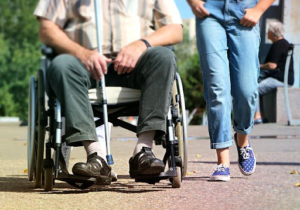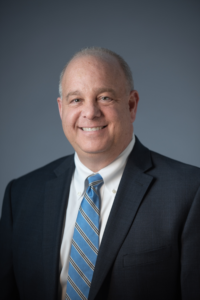Amyotrophic lateral sclerosis (ALS), also known as Lou Gherig’s Disease, is a progressive degenerative disease that affects the nerve cells (neurons) in your brain and spinal cord. ALS/Lou Gherig’s Disease causes a loss of voluntary muscle control and affects walking, talking, and swallowing. Once symptoms begin, they worsen over time.
Unfortunately, there is currently no cure for this disease, nor are there any effective treatments to halt or reverse its progression. However, treatments are available to help reduce symptoms, make patients more comfortable, and may even help patients live longer.
Causes of ALS
Most cases of ALS are sporadic, which means no specific cause is known. About 5-10% of ALS cases are classified as familial, which means that the condition was inherited from a parent.
The risk for ALS increases with age. The most common timeframe to develop ALS is between 40 and 70, although symptoms can develop earlier. While there is ultimately no way to cure the disease, the progression rates for ALS are incredibly variable. Patients who receive an ALS diagnosis typically survive three to five years post-diagnosis, while others may live ten years or even longer.
First Symptoms of ALS
Amyotrophic lateral sclerosis is a difficult disease to diagnose early because it can mimic other neurological diseases. Additionally, there is no single test that can diagnose ALS; a diagnosis requires a variety of exams, tests, and scans to figure out whether you have ALS or something else, which takes time.
It typically takes anywhere from nine to twelve months for someone to be diagnosed with ALS after they first start noticing symptoms. Early symptoms of ALS can start in the muscles in the hands, arms, legs, or feet, or they can begin in the muscles that control speech and swallowing. Since not all people with ALS have the same symptoms, it can be difficult to determine whether a patient is experiencing the first symptoms of ALS or another disease entirely.
Common Early Symptoms of ALS
Nearly two-thirds of ALS cases begin in one of the limbs, such as a hand or foot. The most common early symptom is muscle weakness without pain.
Early Signs of Limb Onset ALS
- Muscle weakness (without pain)
- Muscle stiffness
- Difficulty walking (stumbling, tripping)
- Involuntary jerking of a limb
- Difficulty holding things in your hand
- Muscle cramping in arms or hands
- Muscle twitching
In about one-third of cases, the first symptoms of ALS involve the muscles that control speech and swallowing.
Early Signs of Bulbar Onset ALS
- Slurred speech
- Difficulty swallowing
- Muscle spasms in the face or throat
- Choking on liquids
- Drooling
- Uncontrolled laughing/crying
Other early symptoms of ALS can include respiratory onset, such as shortness of breath, although that is a relatively rare early symptom. ALS can also affect the mind; cognitive and behavioral changes typically begin after the onset of physical symptoms, but in some cases, they may appear first.
ALS Treatment
Treatment and support are available to help address most symptoms of ALS. Individuals diagnosed with ALS can benefit from many different specialists, including but not limited to
- A neurologist
- An occupational therapist
- A respiratory therapist
- A speech therapist
- A psychologist
- A palliative care doctor
Assistive devices like braces and wheelchairs can also help reduce pain, as can approved medications.
The Benefits of Hospice and Palliative Care for ALS
Capital Caring can help those who are suffering from ALS symptoms. By the time a patient reaches end-stage ALS, functionality significantly declines. Hospice and advanced illness care at Capital Caring can help relieve the pain and both the physical and emotional stress of ALS to help ensure the greatest level of comfort for our patients and their families.
If you or a family member could benefit from hospice or palliative care for ALS, do not hesitate to reach out. We offer both inpatient and at-home services throughout the mid-Atlantic area. Please call us anytime, day or night, at 800-869-2136 to learn how we can help.



 Dr. Cheryl-Lynne McCalla, DO
Dr. Cheryl-Lynne McCalla, DO Kathleen Ramkaran, RN, CCM
Kathleen Ramkaran, RN, CCM Hali Gantumur
Hali Gantumur Yasmin
Yasmin  Jennifer Olsen GNP-BC
Jennifer Olsen GNP-BC Meena Raj, MD,
Meena Raj, MD, 

 Kimberly Grove
Kimberly Grove
 Pat Bishop
Pat Bishop Elizabeth Ariemma
Elizabeth Ariemma Ray Jay Garcia, M.D.
Ray Jay Garcia, M.D.
 Heidi Young
Heidi Young Matt Kestenbaum
Matt Kestenbaum
 Anne Silao-Solomon, M.D.
Anne Silao-Solomon, M.D. Matthew Irwin, M.D., M.S.W.
Matthew Irwin, M.D., M.S.W. Catherine McGrady, RN, MSN, is Vice President, Clinical Programs at Capital Caring Health. In this role she is responsible for the development, implementation, and monitoring of clinical programs in support of high-quality patient-centered care delivery across the continuum of services. Catherine also manages external partnerships including Capital Caring Health’s participation in ACOs and other value-based clinical programs
Catherine McGrady, RN, MSN, is Vice President, Clinical Programs at Capital Caring Health. In this role she is responsible for the development, implementation, and monitoring of clinical programs in support of high-quality patient-centered care delivery across the continuum of services. Catherine also manages external partnerships including Capital Caring Health’s participation in ACOs and other value-based clinical programs Jason Sobel, MD
Jason Sobel, MD Kremena Bikov
Kremena Bikov Stacy Brown
Stacy Brown Jackie Gouline
Jackie Gouline Susan Roberts
Susan Roberts Brenan Nierman
Brenan Nierman Annette Lindsay
Annette Lindsay Shannon Collier
Shannon Collier Carla Thompson
Carla Thompson Gabby True
Gabby True Evan Kirschner
Evan Kirschner Margaret Doherty
Margaret Doherty Henry Fuller
Henry Fuller Jennifer Godwin
Jennifer Godwin Sally Hughes
Sally Hughes LaWanda Middleton
LaWanda Middleton Hope Collazo
Hope Collazo Odessa Simpson
Odessa Simpson Anne Young
Anne Young Sherri Parker
Sherri Parker Catherine Kravolec
Catherine Kravolec Heidi Young, M.D.
Heidi Young, M.D.
 Hank Willner, M.D.
Hank Willner, M.D. Audrey Easaw
Audrey Easaw Julia Feldman
Julia Feldman Gus has been a part of the Capital Caring Health family for nearly fifteen years. Ten of those years have been in leadership, working with colleagues and co-workers to achieve the best in their ability while promoting CCH core values. Gus has a background in nursing and a lifelong passion for technology. In each position at CCH, Gus has found ways to integrate technology to enhance outcomes and job satisfaction.
Gus has been a part of the Capital Caring Health family for nearly fifteen years. Ten of those years have been in leadership, working with colleagues and co-workers to achieve the best in their ability while promoting CCH core values. Gus has a background in nursing and a lifelong passion for technology. In each position at CCH, Gus has found ways to integrate technology to enhance outcomes and job satisfaction.
 Linda Biedrzycki
Linda Biedrzycki Joe Murray
Joe Murray Lin Maurano
Lin Maurano Laura Branker
Laura Branker Cameron Muir, M.D.
Cameron Muir, M.D. Cameron Muir, M.D.
Cameron Muir, M.D. Fellowship
Fellowship Lee-Anne West, M.D.
Lee-Anne West, M.D.
 Steve Cone
Steve Cone

 Kieran Shah
Kieran Shah Altonia Garrett
Altonia Garrett Jason Parsons
Jason Parsons Nancy Cook
Nancy Cook Michael Byas-Smith, M.D.
Michael Byas-Smith, M.D. Olubukola Bolaji, M.D.
Olubukola Bolaji, M.D. Jennifer Gerhard, D.O.
Jennifer Gerhard, D.O. Hershell Foster
Hershell Foster Michael Toohig’s Story
Michael Toohig’s Story Liberating Europe
Liberating Europe Marrygold Ugorji’s Story
Marrygold Ugorji’s Story Sherri Parker, Team Leader Medical Social Worker
Sherri Parker, Team Leader Medical Social Worker Colleen Carberry, RN Case Manager
Colleen Carberry, RN Case Manager Paulette Davidson, Chaplain
Paulette Davidson, Chaplain Donna Smith
Donna Smith Tabitha Gingerich, NP
Tabitha Gingerich, NP Dwayne Barton, NP
Dwayne Barton, NP Caitlin Geary
Caitlin Geary Sayaka Hanada
Sayaka Hanada Sherri Parker
Sherri Parker
 Mandy Brouillard
Mandy Brouillard Tamara Barnes, M.D.
Tamara Barnes, M.D. Alan Goldblatt, M.D.
Alan Goldblatt, M.D. Amanda Keerbs, M.D.
Amanda Keerbs, M.D. Adam Knudson, M.D.
Adam Knudson, M.D. Peyman Mamdouhi, D.O.
Peyman Mamdouhi, D.O. John McCue, D.O.
John McCue, D.O. Christopher Pile, M.D.
Christopher Pile, M.D. Maleeha Ruhi, M.D.
Maleeha Ruhi, M.D. Mohammad Saleem, M.D.
Mohammad Saleem, M.D. Jason Sobel, M.D.
Jason Sobel, M.D. Carolyn Richar
Carolyn Richar Susan Boris
Susan Boris Keith Everett
Keith Everett Vivian Hsia-Davis
Vivian Hsia-Davis David Schwind
David Schwind Eric De Jonge, M.D.
Eric De Jonge, M.D. Melissa McClean, N.P.
Melissa McClean, N.P. Shaz Anwar, D.O.
Shaz Anwar, D.O. Petros
Petros  Neil Parker’s Story
Neil Parker’s Story Sulaiman Bangura’s Story
Sulaiman Bangura’s Story Steven Skobel’s Story
Steven Skobel’s Story